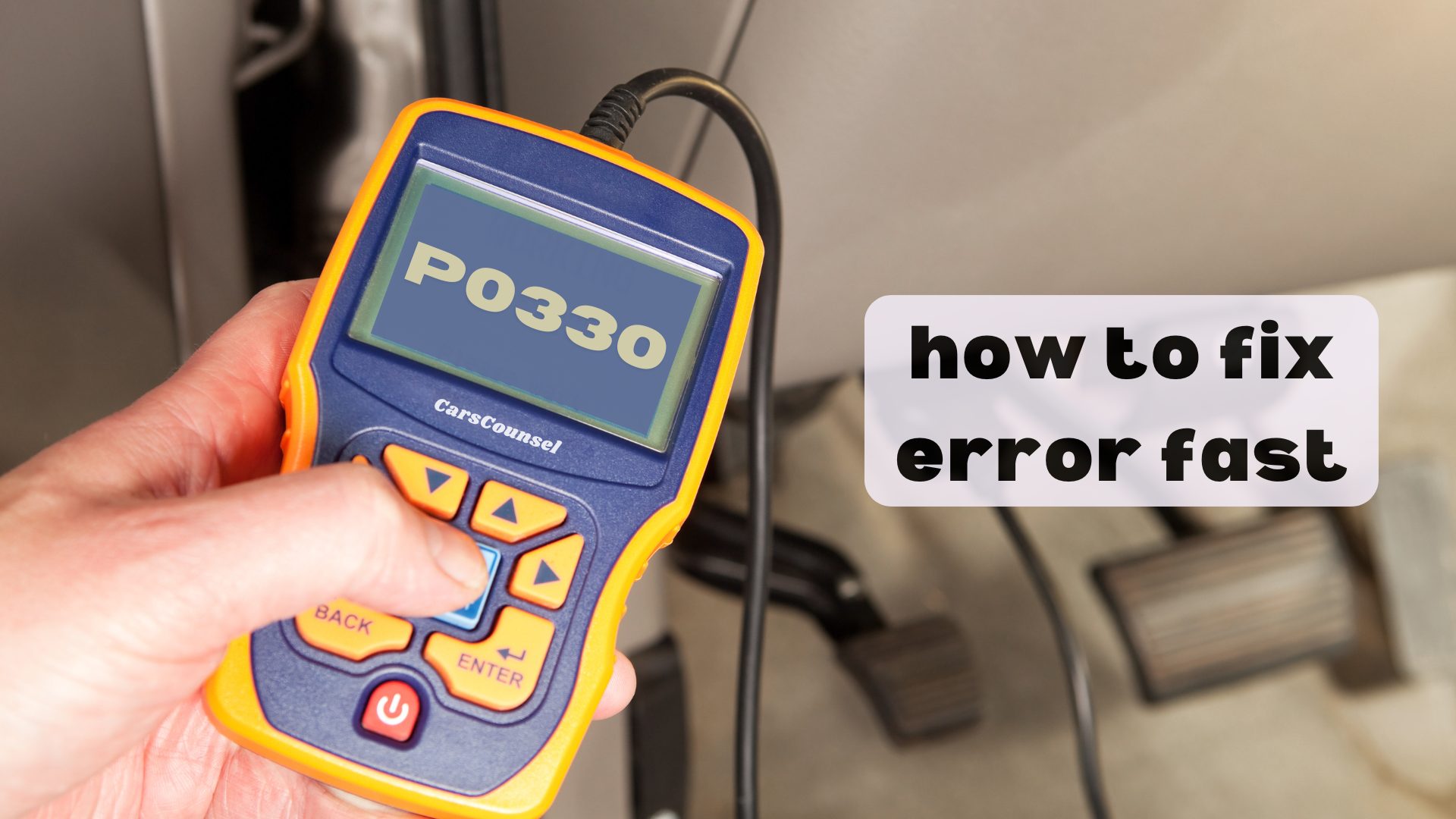You’ve probably never experienced a more frustrating and mystifying issue with your vehicle than the P0330 code – it’s like your car is speaking a language you can’t understand. But in reality, this fault code is trying to tell you that your knock sensor 2 circuit on bank 2 is malfunctioning, which can lead to some serious engine problems down the line.
The question is, what’s causing this malfunction? Is it a faulty sensor, a wiring issue, or something more sinister? You’re about to find out what’s behind this cryptic code and how to get your engine running smoothly again.

Quick Navigation
Key Takeaways
- The P0330 code indicates a malfunction in the knock sensor 2 circuit on bank 2 of the engine, which can affect engine performance and fuel efficiency.
- Sensor failure, wiring faults, engine detonation, engine overheating, and engine mechanical problems are common causes of the P0330 code.
- Symptoms of a malfunctioning knock sensor include engine misfires, decreased fuel efficiency, engine knocking or pinging noises, and an illuminated check engine light.
- To diagnose the P0330 code, use a scan tool to retrieve live data, inspect wiring and connections, and perform a knock sensor resistance test.
- Replacing the knock sensor can cost between $150 and $400, depending on the vehicle’s make and model. Labor and potential related repairs are additional costs.
Code Description and Meaning
When your vehicle’s onboard computer triggers a P0330 code, it indicates a malfunction in the knock sensor 2 circuit on bank 2 of the engine.
This sensor plays a vital role in monitoring engine performance by detecting abnormal combustion in the cylinders and sending signals to the Engine Control Unit (ECU).
The ECU then adjusts the ignition timing to prevent engine damage based on these signals.
A properly functioning knock sensor is essential to guarantee ideal engine performance and fuel efficiency and prevent long-term engine damage.
If the sensor malfunctions, you may experience poor engine performance, reduced fuel efficiency, and potential engine damage.
Causes of P0330 Code
You’ve just diagnosed a P0330 code, which means your knock sensor 2 circuit on bank 2 of the engine is malfunctioning. This code is triggered when the Engine Control Unit (ECU) detects a problem with the knock sensor or its circuit. Now, it’s essential to identify the root cause of the issue to prevent further engine damage.
| Common Causes | Description | Effect on Engine |
|---|---|---|
| Sensor failure | Faulty knock sensor | Poor engine performance, reduced fuel efficiency |
| Wiring faults | Wiring issues or poor connections | Disrupted signal to ECU, engine misfires |
| Engine detonation | Abnormal combustion in cylinders | Engine damage, potential engine failure |
| Engine overheating | Engine operating above normal temperature | Engine damage, knock sensor malfunction |
| Engine mechanical problems | Internal engine issues | Engine performance issues, potential engine failure |
Remember to inspect the knock sensor and its wiring for any damage or corrosion to determine the cause of the malfunction.
Symptoms of Knock Sensor Malfunction
As the knock sensor 2 circuit on bank 2 of the engine malfunctions, you’ll likely notice some telltale symptoms.
Engine misfires or hesitation during acceleration will be one of the first signs, accompanied by a decrease in fuel efficiency. You may also hear engine knocking or pinging noises, which can be alarming.
The check engine light will likely illuminate, and you may experience a loss of power or rough idle. These symptoms are all indicative of poor engine performance, which can lead to further damage if left unchecked.
It’s essential to address the issue promptly to prevent long-term engine damage and maintain ideal fuel efficiency.
Diagnosing the P0330 Code
Connect a scan tool to your vehicle’s onboard diagnostics (OBD-II) port to read the DTC and check for any additional related codes that may help you diagnose the P0330 code.
This will give you a better understanding of the issue and help you identify any underlying problems.
When diagnosing the P0330 code, follow these steps:
- Scan tool tips: Use a high-quality scan tool to retrieve live data and monitor the knock sensor’s output.
- Sensor wiring checks: Inspect the wiring and connections to the knock sensor for any signs of damage or corrosion.
- Perform a knock sensor resistance test to determine if the sensor is functioning correctly.
- Check for engine mechanical issues, such as engine detonation or pre-ignition, which can contribute to the P0330 code.
Repairing the Knock Sensor Circuit
Now that you’ve diagnosed the P0330 code, it’s time to repair the knock sensor circuit.
Start by inspecting the wiring harness for any signs of damage or corrosion. Check the sensor’s resistance using a multimeter to confirm it’s within the manufacturer’s specifications. If the resistance is off, the sensor is likely faulty and needs replacement.
Next, test the sensor’s voltage output to verify it’s sending the correct signals to the ECU. If the sensor is functioning correctly, focus on the wiring harness, looking for any poor connections or shorts that could be causing the malfunction.
Repair or replace the wiring as needed to guarantee a clean signal reaches the ECU. By addressing these potential issues, you’ll be well on your way to fixing the knock sensor circuit and resolving the P0330 code.
Cost of Replacing Knock Sensor
Replacing the knock sensor can be a cost-effective solution to resolving the P0330 code, with the average cost ranging from $150 to $400, depending on your vehicle’s make and model.
This cost includes the replacement of the knock sensor itself, as well as any necessary repairs to the wiring or connections.
When considering sensor replacement, keep the following factors in mind:
- Labor costs: The cost of hiring a professional mechanic to replace the knock sensor can vary depending on the shop’s rates and your location.
- Additional repairs: If other issues, such as wiring problems or engine detonation, are contributing to the P0330 code, you may need to budget for additional repairs.
- Quality of replacement parts: The cost of a high-quality knock sensor can be higher than a lower-quality option, but it may provide better performance and longevity.
- Budget constraints: Be sure to factor in any budget constraints you may have when deciding on a course of action for sensor replacement.
Common Related Codes and Issues
When troubleshooting the P0330 code, it’s essential to check for other related codes that may be triggered by the same underlying issue.
You’ll want to look for codes like P0325, P0327, or P0332, which indicate a sensor failure or circuit malfunction. These codes can be related to the knock sensor 2 circuit malfunction on bank 2, and addressing them simultaneously can help resolve the issue more efficiently.
Additionally, you should also check for codes related to ignition timing, such as P0010 or P0011, as incorrect ignition timing can contribute to the P0330 code. By checking for these related codes, you can identify the root cause of the problem and make the necessary repairs to prevent future issues.
Preventing Future Knock Sensor Malfunctions
By maintaining your vehicle regularly, you can significantly reduce the likelihood of future knock sensor malfunctions.
Regular tune-ups and sensor maintenance can go a long way in preventing issues.
- Regular Tuning: Verify your engine is properly tuned to prevent engine detonation or pre-ignition, which can damage the knock sensor.
- Sensor Maintenance: Clean the knock sensor regularly to prevent corrosion and guarantee proper function.
- Monitor Engine Performance: Keep an eye on your engine’s performance and address any issues promptly to prevent them from causing knock sensor malfunctions.
- Use the Correct Fuel: Use the type of fuel recommended by your vehicle’s manufacturer to prevent engine knocking or pinging noises that can damage the knock sensor.
More OBD-II Codes
Frequently Asked Questions
Can a Faulty Knock Sensor Cause Long-Term Engine Damage?
You need to address a faulty knock sensor promptly, as it can lead to long-term engine damage if left unchecked, preventing engine pinging through proper sensor function, and understanding sensor failure modes is vital to prevent catastrophic engine consequences.
Will a Malfunctioning Knock Sensor Affect Engine Performance Immediately?
You’ll likely notice engine hesitation immediately if your knock sensor is malfunctioning, as it disrupts the engine’s combustion process; however, prompt sensor replacement can prevent long-term damage and restore peak engine performance.
Can I Drive Safely With a P0330 Code Illuminated on the Dashboard?
Like a ticking time bomb, sensor failure lurks, threatening your engine’s well-being. While it’s possible to drive with a malfunctioning knock sensor, it’s not recommended for safe operation, as it can lead to poor performance, decreased fuel efficiency, and potential long-term damage.
Are Knock Sensor Malfunctions More Common in Certain Vehicle Models?
You’ll find that knock sensor malfunctions are more prevalent in certain vehicle models due to design flaws or inferior sensor quality. Model trends suggest that vehicles with higher compression engines or those prone to engine knocking are more susceptible to sensor failures.
Can a Tune-Up or Oil Change Fix a Knock Sensor Circuit Malfunction?
You’re “beating around the bush” if you think a tune-up or oil change will fix a knock sensor circuit malfunction. In reality, spark plugs replacement and fuel injector cleaning might help, but you’ll likely need to replace the faulty knock sensor to get your engine running smoothly again.
Conclusion
You’ve dealt with the P0330 code, and now you know what it takes to diagnose and repair it. Remember, a faulty knock sensor can lead to serious engine damage, so don’t ignore that check engine light. Notably, did you know that a single misfire can decrease fuel efficiency by up to 20%? Don’t let your engine suffer – address the issue promptly and guarantee your vehicle runs smoothly and efficiently.

